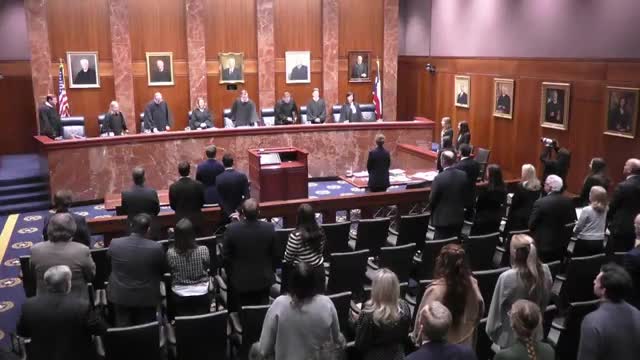Attorney General Paxton urges court to allow quo warranto and enforcement against Annunciation House; defense calls claims unproven
Get AI-powered insights, summaries, and transcripts
Subscribe
Summary
At oral argument the court heard competing claims over whether Annunciation House’s sheltering of undocumented migrants amounts to criminal 'harboring' and whether Quo Warranto/Quo warranto remedies and RFRA raise bar to enforcement; parties disputed concealment, intent, and whether the record suffices to pursue forfeiture or injunction remedies.
The Supreme Court of Texas heard argument in Texas v. Annunciation House, a quo warranto and enforcement action brought by the Texas attorney general alleging that the ministry knowingly shelters undocumented aliens in violation of state alien‑harboring law. The state asked the court to permit aggressive remedies—including temporary injunctions, quo warranto and potentially corporate charter forfeiture—arguing Annunciation House’s admissions and post‑subpoena conduct show intentional harboring and interference with law enforcement. Annunciation House and religious freedom amici urged protection under Texas’s Religious Freedom Restoration Act (RFRA) and denied concealment or intentional obstruction of officials.
Why it matters: The case tests the reach of state criminal harboring provisions and the use of quo warranto as a remedy against a religious nonprofit. It raises constitutional and statutory questions about religious‑exercise protections (RFRA), the proper remedies for alleged criminal behavior by a nonprofit, and the scope of discovery and enforcement powers of the attorney general.
State argument: Counsel for the attorney general told the court the complaint pleads three categories of conduct that independently could constitute harboring—(1) knowingly sheltering illegal entrants because of their immigration status, (2) actively hampering law enforcement (for example, denying entry without warrant), and (3) interposing frivolous objections to subpoenas to protect guests. The state emphasized deposition testimony in the record in which Annunciation House’s leadership admitted the organization’s mission focuses on helping those not here legally and that the organization told guests it would protect them after a subpoena was served. The attorney general relied on federal precedents and cited United States v. McClellan for the proposition that intentional sheltering tied to an alien’s unlawful status can satisfy harboring elements.
Defense and amicus arguments: Annunciation House’s counsel and its amicus (First Liberty Institute) argued the record contains no evidence of concealment or active obstruction and that the organization mostly houses people processed by federal authorities. Counsel emphasized Fourth Amendment rights, privacy and that denying consent to a search is not evidence of wrongdoing. They also urged that RFRA forbids the court from terminating the charter of a religious charity as a remedy that would substantially burden religious exercise. The amicus stressed the charitable and religious motivation for the organization’s activities.
Justices pressed both sides on the record’s factual sufficiency. The court asked whether the state’s pleadings and attached materials show concealment “from detection,” an element the state’s brief later conceded is required. Defense counsel pointed to a table in their bench memo comparing state characterizations to the underlying record and said the record lacks proof that Annunciation House concealed or hid individuals from law enforcement. The state replied that executive‑level admissions, the post‑subpoena conduct and a pattern of purposeful assistance to illegally present migrants are enough at the pleading stage to seek quo warranto and discovery.
The court recessed and submitted the case. The decision will address whether the pleadings and record suffice to pursue quo warranto and whether RFRA or other constitutional protections bar the remedies the attorney general seeks.
